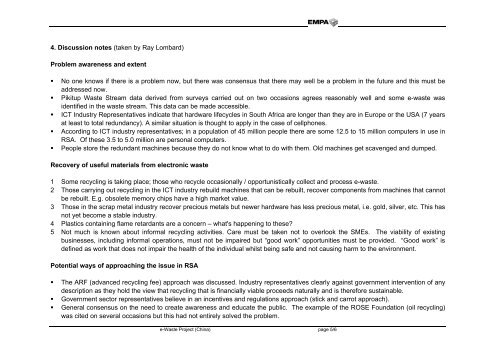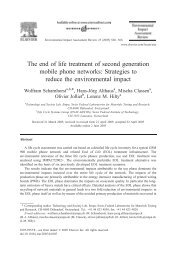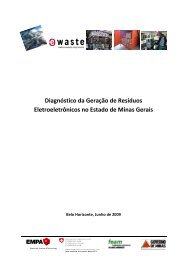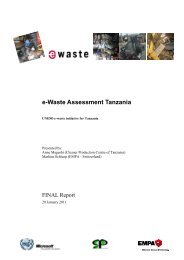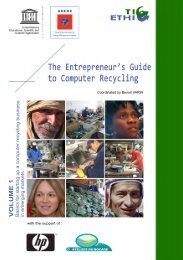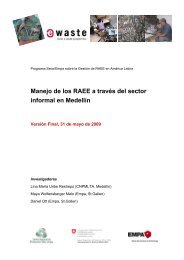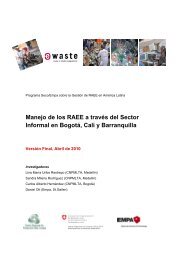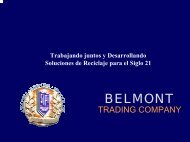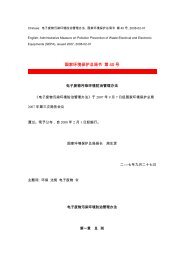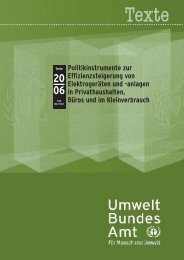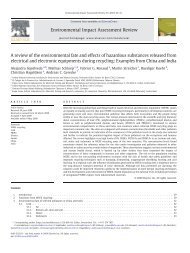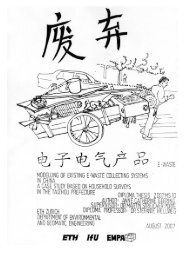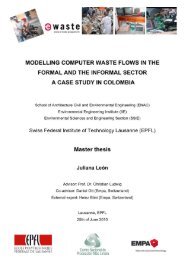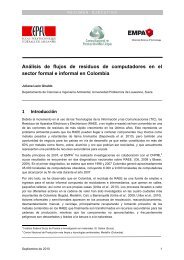E-WASTE ASSESSMENT IN SOUTH AFRICA - e-Waste. This guide
E-WASTE ASSESSMENT IN SOUTH AFRICA - e-Waste. This guide
E-WASTE ASSESSMENT IN SOUTH AFRICA - e-Waste. This guide
You also want an ePaper? Increase the reach of your titles
YUMPU automatically turns print PDFs into web optimized ePapers that Google loves.
4. Discussion notes (taken by Ray Lombard)Problem awareness and extent• No one knows if there is a problem now, but there was consensus that there may well be a problem in the future and this must beaddressed now.• Pikitup <strong>Waste</strong> Stream data derived from surveys carried out on two occasions agrees reasonably well and some e-waste wasidentified in the waste stream. <strong>This</strong> data can be made accessible.• ICT Industry Representatives indicate that hardware lifecycles in South Africa are longer than they are in Europe or the USA (7 yearsat least to total redundancy). A similar situation is thought to apply in the case of cellphones.• According to ICT industry representatives; in a population of 45 million people there are some 12.5 to 15 million computers in use inRSA. Of these 3.5 to 5.0 million are personal computers.• People store the redundant machines because they do not know what to do with them. Old machines get scavenged and dumped.Recovery of useful materials from electronic waste1 Some recycling is taking place; those who recycle occasionally / opportunistically collect and process e-waste.2 Those carrying out recycling in the ICT industry rebuild machines that can be rebuilt, recover components from machines that cannotbe rebuilt. E.g. obsolete memory chips have a high market value.3 Those in the scrap metal industry recover precious metals but newer hardware has less precious metal, i.e. gold, silver, etc. <strong>This</strong> hasnot yet become a stable industry.4 Plastics containing flame retardants are a concern – what's happening to these?5 Not much is known about informal recycling activities. Care must be taken not to overlook the SMEs. The viability of existingbusinesses, including informal operations, must not be impaired but “good work” opportunities must be provided. “Good work” isdefined as work that does not impair the health of the individual whilst being safe and not causing harm to the environment.Potential ways of approaching the issue in RSA• The ARF (advanced recycling fee) approach was discussed. Industry representatives clearly against government intervention of anydescription as they hold the view that recycling that is financially viable proceeds naturally and is therefore sustainable.• Government sector representatives believe in an incentives and regulations approach (stick and carrot approach).• General consensus on the need to create awareness and educate the public. The example of the ROSE Foundation (oil recycling)was cited on several occasions but this had not entirely solved the problem.e-<strong>Waste</strong> Project (China) page 5/6


